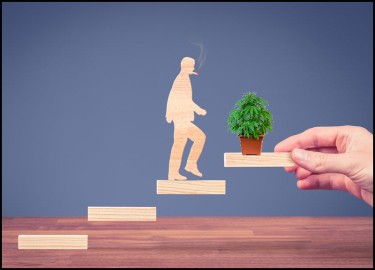Cannabis News
Society and Their Substances – What Do You Really Know About Drugs and the People Who Use Them?
Published
2 years agoon
By
admin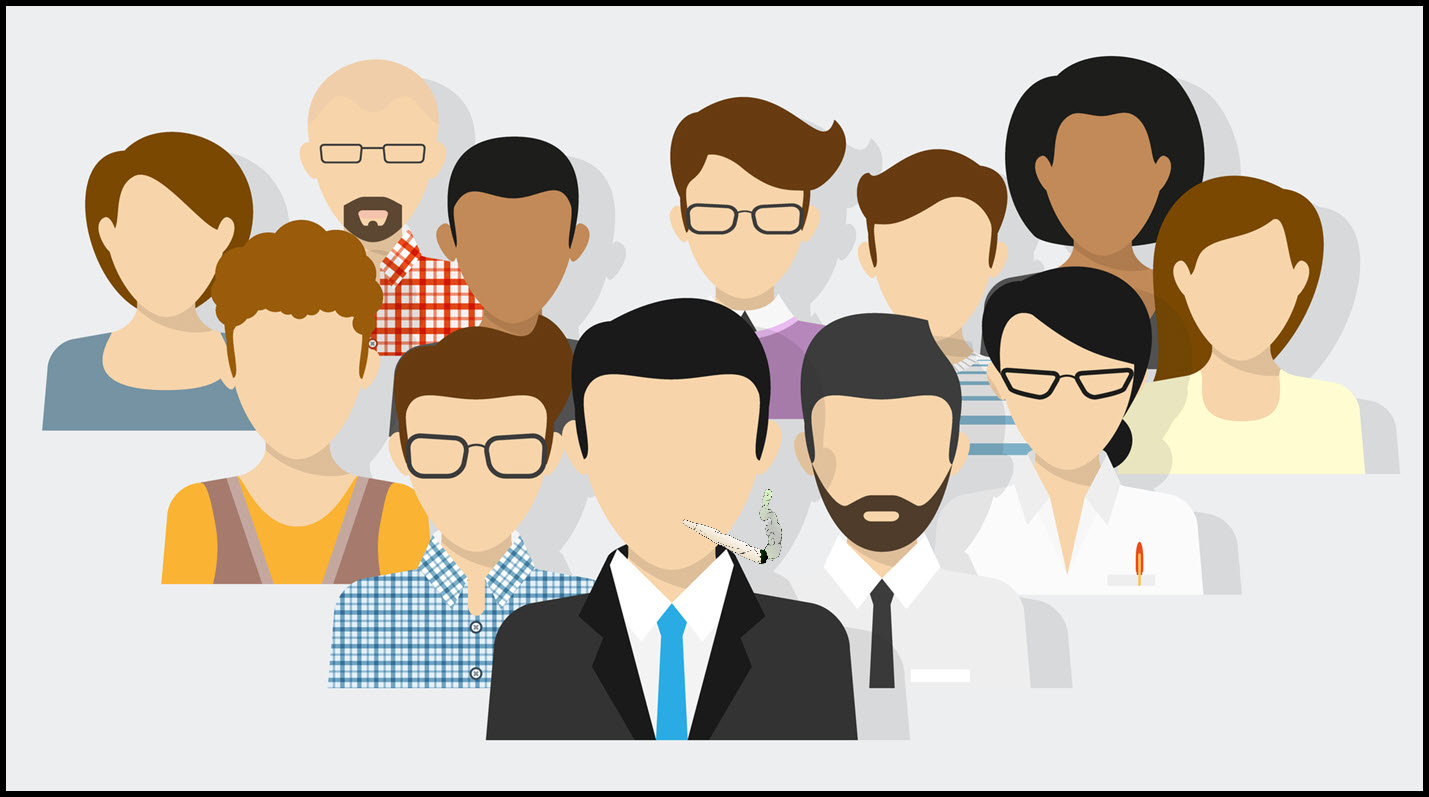
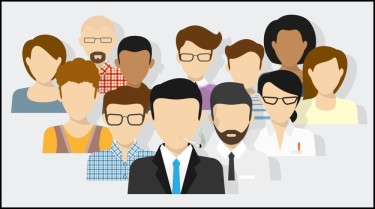
Society and their Substances: Dispelling the Common myths of Drugs and Drug Users
Have you ever wondered “why” are drugs illegal? Some might look to places like Portland Oregon and say, “Just look at Portland, junkies wandering the streets, doing heroin out in the open!” and they wouldn’t be wrong.
Portland decided to decriminalize all drugs, and made it no more criminal than a speeding ticket. But there was a catch, if the drug user wanted a medical health check, the $100 fine would be waved with the idea of getting the user in touch with medical professionals.
While humane, it’s obvious that these policies aren’t crafted by professional drug users. It’s often the case that “non-drug users” dictate the policies of “drug users” in the name of public health, yet have no understanding of the psychology of an addict.
Even the best addiction expert would never be able to understand the fundamentals of an addict’s mind until he or she becomes addicted to something. The logic, the reasoning, the internal dialogue all change to support the addiction, or to use it as a crutch to blame them for all their problems.
Yet, what news outlets like Fox ignore with the city of Portland is that there is a large homeless population. And when there is misery mixed with cheap and accessible drugs with little criminal penalties or education programs in place – you’ve got a cocktail for disaster.
Now, do we blame “drugs” for this…or is this a problem of the policies surrounding drugs?
Of course, one cannot discard that some drugs are just inherently more damaging to the human body and mind than others. For example, it’s not the same smoking a strong joint than it is injecting yourself with heroin. Therefore the word “drugs” cannot begin to fully encompass the whole problem with “drugs”.
It’s a blanket statement that ignores all the nuance of drugs, their users, and the interaction between substance and society.
Is there a way to fix Portland? Well, yes – but criminalizing drugs is not the way. In fact, criminalizing drugs is counter productive as it makes the environment surrounding drug use, sales, and distribution more lucrative and more dangerous. Other than, “drugs are done in the shadows”, there is no inherent benefit of drug prohibition.
I’ll get a bit into how one could possibly address this problem later on, however – to begin to understand the complexity of “Drugs”, let’s begin by addressing the myths.
Myth 1: There’s a clear definition for Drugs!
“He was doing the drugs!” a worried mom confesses to her neighbor while finishing her third glass of wine. Her nerves finally settled and the social lubricant unhinged her jaw so her soul could sing her anxieties to the world, unbothered by the consequences.
Not to get all Matt Walsh on you folk but… “What is a drug?”
The truth is a “drug” by definition is any substance that changes you physiologically and has an impact on your psychologically”.
Or if you want to get technical, the American Heritage dictionary defines drug as, “A chemical substance, such as a narcotic or hallucinogen, that affects the central nervous system, causing changes in behavior and often addiction.”
Here’s the thing…everything is a “chemical substance”. If you’re putting sugar in your coffee, you’re putting “chemical substances in other chemical substances”·
Secondly, it needs only to affect the central nervous system, causing changes in behavior and often addiction?
Well, under that classification sugar is one hell of a drug – and we give it to children!!!
WHY WON’T ANYONE EVER THINK ABOUT THOSE CHILDREN!!!
Karen 2:19, The Big Book of Karens
Yet when you say, “He did drugs” you’re not thinking about the guy who snarfed down 18 Twinkies. You’re thinking, “Portland Oregon” aren’t you?
Well, that’s because Uncle Sam’s mind control and propaganda machine did its job and installed a bias towards certain drugs. With the help of Pharma, they have been shaping the way we view the definition of drugs since the 1970s.
This is because in the 1971 Controlled Substance Act, Pharma was granted basically “ownership” of all drug development and research in the US, and basically a handful of government sanctioned companies would become our “pharma overlords”.
Along with the FDA [funded by them] and the DEA [Funded by you], Pharma could create the biggest, most insidious monopoly in the world – and then involved the Military Industrial Complex for fun.
[1970s] Pharma: “Hey man, so Colombia – they be making some mad cocaine and its undercutting our profits!”
DEA: Sure, we’ll go create violent altercations between local law enforcement and drug dealers and coerce the government to adopt our strict “anti-drug rhetoric” drafted up by the Prison Industrial Complex!”
Pharma: “Nixon would be proud!”
Yes, and while this might sound highly conspiratorial to some of you – it’s very well documented and all it takes it to walk down the history of drug prohibition to spot the shitfuckery a mile away!
The 1971 Controlled Substance Act gave power to Pharma, and Pharma used this opportunity to “re-educate the populace” by calling what they produce “medicine” and what anyone other than them produce “drugs”.
Yet often times, it’s the “medicine” that comes with 50-side effects including rectal bleeding – but smoking weed is as bad as heroin!
Oh yea, according to the hallowed document that ensured the government authority over your body, cannabis is classified as having “no medical value and a high potential for abuse”. Anyone who has taken any drugs would understand that this is absolute nonsense.
What’s more, tobacco nor alcohol is on the Controlled Substance Act – those drugs aren’t the same as the “other-other drugs” produced by those brown people in the hills laced with demon juice and murder!
The definition you subscribe to about drugs is sadly not yours – it’s a plant. And invasive parasite created by an entity that sees you as the “product”. You are the stock. That’s why you’re not allowed to consume certain “drugs” – it might make you think too much outside of the box.
Myth 2: People who use drugs are suffering from substance use disorder
Most people who use drugs are not particularly addicted. Well, perhaps as addicted as you are to coffee. It’s something that you depend on daily (in the case you’re a coffee drinker), however, it’s not the end of the world when you miss it a day or two.
You might have some low-key physical withdrawal…and in fact, detoxing from coffee is one hell of a detox! Don’t believe me? Go 90-days without coffee and see how addicted you truly are!
Yet some people even wear this addiction as a badge! “I’m totally addicted to java bro!” “Me too!”
There are some drugs that are socially accepted, and even “addictive behavior” is celebrated because the drug itself is seen as benign. People literally go binge drink to get “totally wasted” and laugh about it, even though more people die from alcohol poisoning each year than all of the psychedelic drugs combined.
Yet getting “smashed” is celebrated. “Hangover 1,2,3” is an homage to the whole “getting shitfaced” ideals of the American Badass.
But even then, the vast majority of people who drink alcohol do so in moderation – and this goes for virtually every other drug except maybe for meth, crack, and some lower quality substances. These tend to create devastating physiological responses to the substances, and hyper-addicts tend to kill themselves with it.
Nonetheless, for the vast majority of drugs…people take them responsibly. Just think about it, you do your taxes, you invest your money, you plan vacations, you’ve got a job with a lot of responsibility. If you ever decide to take a psychedelic – wouldn’t you apply the same level of care and attention to the experience?
Of course you would! You’d learn that you don’t need to take a lot of it, you’ll understand set and setting – take it, experience it…assess whether you need more or whether you’re finished…and go about your way.
This is virtually the experience of the common drug user. I for example, am a psychonaut and have been practicing for 20-years. The last time I took a psychedelic was 2 years ago and haven’t had the opportunity nor the “calling” to dive back into a deep weekend of psychedelia.
Typically, however, I use psychedelics once or twice a year. I might microdose for periods of creation and project management, but beyond this – I keep my use of psychedelics in check and for specific purposes.
With proper education, most people would learn the ins and outs of certain drugs, how they behave, what frequency they can use them safely, etc.
The DSM-V, the diagnostic tool [created by pharma], has a particular definition of what it means to have Substance Use Disorder, and they have definitions based on different drugs. However, their classifications are done purely from a pharmacological perspective with no understanding of psychological interplay between a particular person and a substance.
Why is it that the homeless in Portland are doing hard drugs constantly, but Dr. Keven Hart understands how to use heroin for recreational purposes?
Personally, I’m not all that interested in heroin, but if a person can take it responsibly in their own home – then they should be able to do it. And under the DSM-V any kind of heroin use would be considered “substance abuse disorder”.
And this goes back to the classification of “drugs” we covered earlier. The “bad drugs” vs the “good drugs” get different treatment and tolerance thresholds. They decide when you’re addicted, and being addicted is bad – except if it’s tobacco, sugar, alcohol, fast foods, etc.
Myth 3: Drug Users are dirty, immoral, and dangerous losers…
A heroin user, coke user, and a cannabis user walked into a bar – and nobody could judge which one used which….and probably, some of them had high paying jobs…
To think “drug users” are dirty is to think “soda drinkers are fat” or “fast food eaters” are poor. Who is a fast food eater? What does a “soda drinker” look like?
You can’t define them because “everyone” uses it as “everyone” uses drugs. If we’re talking about the “naughty drug list” – the principle remains consistent. If you see me in real life, you would have no idea that I have huddled on the edge of cosmic portals, deeply entrenched in a hallucination after consuming LSD.
You’d say, “look at that responsible, and respectable tax payer!” Because, I have long learned to shift my external appearance to become invisible to the police. The youth dress provocatively, the wise dress practically.
Furthermore, if substance use had anything to do with “morality” or “hygiene”, then I wonder what moral outcome eating hot dogs produce? If you consume a lettuce, do you become a morally ‘better’ person?
After all, if drug use can dictate morals, then food must also play a role. If you drink a beer, do you become “neutral?”
Who dictates the morality scale in correlation to the substance used?
As you can see my friends, when you begin to poke at these myths – they begin to come apart. This is because this particular myth comes from early prohibition – Reefer Madness! Even though reefer madness wasn’t the first mechanism of stereotyping a group of people, it is the most known.
Drug prohibition has long utilized this tactic of “demoralization of a group” in order to justify their atrocities. It’s a more subtle Hitlarian “blame the Jews” tactic of creating a public boogie-man that allows people to pass laws they would commonly not pass.
For example, with the Chinese immigrants who used opium, they were demonized as a group when settler sons and husbands were caught get high and dirty with their Asian brethren.
Then laws were drafted up based on early Christian morality – which was based in puritanism for the most part – which is basically to deny yourself of all pleasures for the sake of getting a mansion in heaven or something of the sort.
The point is, morality is a subjective slippery slope. In the 1960s, any church endorsing gay marriage would have been excommunicated by their peers – now they are opening their doors all over the place.
Morals shift, and the argument that “all drug users are dirty and immoral” is a weak one that could easily be flipped on virtually every substance – simply because morals are fluid.
Myth 4: People take drugs because they have problems
While some people do take drugs to mask their problems, the vast majority take drugs for its effects. When I’m eating a psychedelic mushroom out in the wilderness, I’m not thinking, “If I take this, all my troubles will melt away!”
Rather I say, “Oh shit…relax, and let go…what comes up will come down…” and then I relax, breathe, spark up a joint and ride the magick into the cosmos.
Why do I do this?
Well, for starters, when you enter into a state of psychedelia – your brain begins to connect in ways it commonly does not. It enters into a state of “hyper-plasticity” meaning that you become less “rigid” in your thinking.
You can then, in this state, confront situations in your life from a completely new perspective. At times, it makes you realize that the way you have been looking at an idea or concept or challenge in your life, can be resolved by simply shifting your behavior or the way you feel about it.
Sometimes you can accept the loss of a loved one, or figure out a way to deal with that constant anxiety you’ve been feeling, peaking into the darkness and allowing the unconscious to manifest.
This is how I use psychedelics. Other people use it in different ways. But for no way am I using it to “get rid of my problems” or to “escape them”.
The heroin junkies in Portland aren’t escaping their problems – they are numbing their pain. They are abandoned, they live on the streets, they have no one that loves them, they are alone.
Why the hell wouldn’t you want to just numb yourself for as long as you can if you can see no escape from the hell you are living?
However, for the rest of us who take drugs responsibly – no one is trying to mask their problems with drugs. I smoke weed because I like to get high, I like how it interplays with my creative process and counterbalance it with caffeine.
Myth 5: Regular Drug use leads to addiction
Well, I’ve been smoking cannabis for about twenty years and if there’s anyone who should be addicted to it by now, it should be me.
Except, I frequently take breaks for months at a time and utilize different states of mind to achieve certain tasks. There are moments when absolute sobriety helps me, and then there’s moments when I smoke weed at the end of the day. There are days I smoke in the morning.
However, to claim I’m addicted to weed would be wrong, even though according to the DSM-V I’d probably be classified as such.
Once again, addiction isn’t necessarily bad. We all have our little addictions, yet we’re socially functional. We’re available to our children, we do our work, we don’t slack.
Why is it okay to play video games for 4 hours after work every day, yet you can’t smoke a bong rip? Why is one “relaxing” and the other one “addiction”.
Bias – that’s why!
Myth 6: Taking Drugs Damages People
The number one killer in the United States is heart disease. The #1 cause for heart disease is poor diet.
Considering that people eat so much fast food in the US – shouldn’t the fact that they are damaging themselves be reason enough to ban fast food? Perhaps not ban fast food, perhaps – we could weigh people at the front door which would give them a suitable menu based on their likeliness of developing a chronic disease.
I know some people may scoff at this idea, but it’s essentially what we’re doing with all drugs. We’re saying, “because this substance may cause physical harm…it should be illegal!” yet we don’t hold the same standards to other drugs or foods in society.
Why is it conveniently untaxable, non-pharma drugs that “damages people”, and should be illegal – but legal drugs produced by pharma has a threshold on deaths before it gets recalled?
If harm is the metric for illegality, then we should begin to restrict people’s diets because it is costing the taxpayer billions, people are taking up hospital beds that could be for healthy people that don’t eat themselves into heart disease….
Ya, sounds a bit “Nazi?” That’s because it is!
And the justification of keeping drugs illegal because of possible harm then should be applied to all substances, otherwise it undermines the very justification for keeping it illegal.
The Sticky Bottom Line
You’re not going to save the Portland problem by criminalizing drugs. You can do it by
-
Addressing the homeless problem
-
Creating Drug Centers, where they get free drugs like in Switzerland. There is no need to get into rehab, although it’s available. You can have as much drugs as long as it’s not a lethal dose.
-
Educate people – we don’t need to teach people which drugs are bad…we need to teach them how to use drugs if they choose.
You can have amazing results from certain drugs. Modern research is showing us that psychedelics has the ability to do what common psychiatric medicine is failing. It can help us dissolve PTSD, make people break addiction in a single session, and completely transform their lives.
But if we keep on playing the prohibition game – we’re only going to continue to keep the solutions in the dark, under the thumb of Pharma – who certainly won’t ever put profits over people.
SOCIETY AND LEGALIZATION, READ ON…
You may like
-


Former New York Knick Iman Shumpert debuts ‘TSA Approved’ legal cannabis brand
-
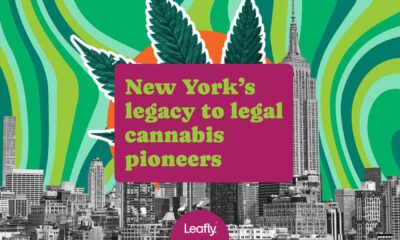

How New York pot pioneers made it to legal dispensary shelves
-


Scientists Now Think That One Compound in the Cannabis Plant Can Replace All Opiates
-
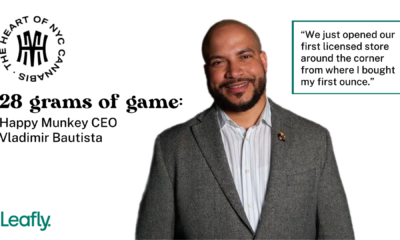

Vladimir Bautista is leading Happy Munkey’s legacy-to-legal takeover
-


Cannabis Can Help A Sore Throat
-
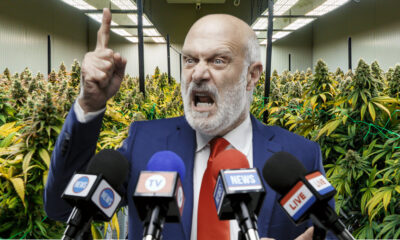

Cannabis and the Authoritarian State
Cannabis News
Scientists Now Think That One Compound in the Cannabis Plant Can Replace All Opiates
Published
6 hours agoon
April 3, 2025By
admin

Which Cannabis Compound Do Scientists Think Can Replace Opiates?
…And Why This Is Important
Opiates are a type of pharmaceutical drug that’s been made from the opium poppy plant. While it’s somewhat a ‘natural’ substance that’s been extracted from the fibers and sap of the opium poppy plant, these are extremely dangerous sedatives that act on the central nervous system. However, there are completely synthetic opioids as well, which are manufactured entirely in laboratories.
Famous examples of well-known and widely-used opiates today include heroin, codeine, and morphine. They all work similarly, binding to the brain’s opioid receptors and users feel a drastic reduction in pain. It also causes users to feel euphoric, drowsy, or sleepy. Common side effects include constipation and nausea.
Because opiates are powerful for dulling one’s pain perceptions, they have become commonly prescribed by doctors and hospitals for pain relief. That said, opiates have become one of the world’s most addictive, dangerous, and fatal drugs – and you can get prescribed it right by your very own physician. Repeated use of opiates can easily lead to dependence and addiction, and eventually consuming high doses can drastically slow down breathing, and cause brain damage, or even death.
Since doctors still keep prescribing opioids, this has resulted in the deadly Opioid Epidemic, which has killed thousands of people. It’s a worrisome public health crisis, most especially because of fentanyl, an illegally manufactured opioid which is said to be 50 times more potent than heroin.
Could The Answer To The Opioid Epidemic Lie In Cannabis…Terpenes?
The past few years have shown that cannabis legalization is critical for surviving the opioid epidemic, and reducing overall opioid consumption.
The results of a recent research paper, which builds on past studies conducted by Dr. John Streicher, who is a member of the Comprehensive Center for Pain and Addiction, reveals fascinating findings. According to Streicher, cannabis terpenes were found to provide relief in inflammation models as well as on neuropathic pain caused by chemotherapy.
For the study, Streicher and his research team analyzed 4 kinds of terpenes that are found in mid to high levels in Cannabis sativa plants: linalool, geraniol, beta-caryophyllene, and alpha-humulene. They discovered that each terpene produced significant pain relief among mice subjects with fibromyalgia and post-operative pain, and among the terpenes, geraniol was found to be the most powerful.
“Our research is showing that terpenes are not a good option for reducing acute pain resulting from an injury, such as stubbing your toe or touching a hot stove; however, we are seeing significant reductions in pain when terpenes are used for chronic or pathological pain,” he said. “This study was the first to investigate the impact of terpenes in preclinical models of fibromyalgia and post-operative pain and expand the scope of potential pain-relieving treatments using terpenes,” Streicher said.
Cannabis terpenes are the compounds responsible for the aromatic profile of each strain; they are located in the plant trichomes. Not only do they contribute to each strain’s unique flavor and odor, but they also have valuable therapeutic and medicinal benefits. There are around 150 kinds of terpenes known today, though in the entire plant world, there are known to be some 20,000 terpenes.
Understanding the therapeutic benefits of terpenes is incredibly valuable also because they don’t contain THC (tetrahydrocannabinol), the compound in marijuana that gets you high.
“With fibromyalgia, there isn’t much of an understanding of what the pain state is, and there are not a lot of great options for treating it,” explains Streicher. “Our findings show that terpenes may be a viable treatment option for fibromyalgia pain, which could potentially have a large impact and make a difference for an under-treated population.”
Other Studies
This is not the first time that cannabis terpenes have been found to demonstrate excellent pain-relieving properties. It must be noted that just like what Streicher says, terpenes seem to do better with chronic pain management, instead of acute pain management.
Another study from 2024, which was published in The Journal of the Association for the Study of Pain, was conducted by researchers at the University of Arizona and the National Institutes of Health. The investigators analyzed the analgesic properties of different terpenes including geraniol, humulene, linalool, pinene, and caryophyllene among mice subjects with chemotherapy-induced peripheral neuropathy.
According to the researchers, all the terpenes delivered analgesic effects that were equivalent to around 10 mg/kg of morphine. It was also interesting to note that administering both morphine and terpenes together at low doses resulted in ‘enhanced’ pain-killing effects.
“Together these studies identify cannabis terpenes as potential therapeutics for chronic neuropathic pain,” said the investigators.
There have also been other studies that have found that combining cannabis with opioids can indeed provide long-lasting pain relief. It comes with the added benefit of reducing opioid doses needed for effective pain control. This phenomenon is called opioid-sparing. These types of protocols can be beneficial for patients who suffer from severe, chronic pain caused by cancer, arthritis, joint problems, fibromyalgia, diabetes, post-surgical pain, migraines, nerve damage, and so much more.
Conclusion
Learning more about the pain-killing properties of terpenes is extremely valuable for the medical community, patients, and even society as a whole. We can all do with less opioid addictions because it has torn families apart, and caused the deaths of thousands of people.
Terpenes, or cannabis in general, offer a natural and safe alternative that can be complementary to other pharmaceutical treatments designed to reduce pain.
SWAPPNG OPIOIDS FOR CANNABIS, READ ON…


Cannabis and the Authoritarian State
Cannabis has been legal for longer than it has been illegal. Let that sink in for a minute. For thousands of years, humans cultivated and consumed cannabis freely across civilizations and continents. It wasn’t until the early 1900s that we witnessed a massive push to drive hemp and cannabis into the black market, primarily due to industrial competition from petrochemicals, pharmaceuticals, and other industrial applications.
What makes cannabis so threatening to powerful interests? For starters, hemp and cannabis are highly versatile crops with over 50,000 different uses, from medicine to textiles to fuel. Even more remarkable is how this plant is hardwired to work with the human body through our endocannabinoid system—a biological network we didn’t even discover until the 1990s.
Perhaps most threatening of all is that cannabis is insanely easy to grow. This means that if the plant helps you with a particular physical ailment, you have the ability to grow your own medicine indefinitely. No insurance premiums, no wait lists, no pharmaceutical middlemen—just you cultivating your own healing directly from the earth.
Authoritarians do not like this, not one bit. When people can meet their own needs independently, power structures lose their grip. When citizens can think differently without permission, control systems begin to fail. So today, we’re going to look at the interesting relationship between authoritarianism and cannabis, and how this humble plant plays a key role in keeping you free.
We’ve already established the versatility of cannabis, but there’s another element that those old D.A.R.E. PSAs inadvertently reveal about what authoritarians think about cannabis. I’m talking, of course, about “behavior.” You see, in an authoritarian system, you and I are but cogs in the machine. We’re the expendables who should be proud to work ourselves to death for our “fearless leaders.”
This is precisely why certain ideas, philosophies, religions, movements, books, and substances are typically banned in authoritarian regimes. Take North Korea as an example: everything from the type of television citizens watch to the music they hear is a tightly spun spell designed to keep the populace in check. While they don’t have explicit laws against hemp (they actually grow it industrially), smoking psychoactive cannabis is strictly forbidden.
Contrast this with places like Malaysia, where you can get up to 5 years for possessing just 20 grams of cannabis, and even face the death penalty depending on the situation. These authoritarians don’t play around when it comes to cannabis because they know it affects the behavior of their populace in ways they can’t control.
The question becomes: what behavior do they fear so much that cannabis produces within the individual?
The answer is a critical mind. People who consume cannabis often begin to question their own belief systems. Most regular users undergo some transformation in their values and perspectives. Cannabis has a unique way of helping people see beyond cultural programming and think outside established paradigms. It can make the familiar strange and the strange familiar—a psychological state that’s antithetical to authoritarian control.
This independent thinking runs counter to the narrative of authoritarians who wish to maintain a tight grip on social consciousness. If even 10% of a population begins to pivot in their behavior within a regime, it can have massive ripple effects. Just look at cannabis in the US—it went from being demonized to being embraced by the majority in less than 80 years, despite massive propaganda efforts.
For authoritarians, psychoactive cannabis isn’t primarily a threat to public health and wellbeing—it’s a threat to the health and wellbeing of authoritarianism itself. When people start thinking differently, they start living differently. When they start living differently, they start demanding different. And that’s the beginning of the end for any system built on unquestioning obedience.
Beyond the threat to thought control, there’s another reason why drugs in general remain illegal: the state can use prohibition as a weapon against the populace. This isn’t conspiracy theory—it’s documented history.
Take Nixon’s war on drugs. His domestic policy chief, John Ehrlichman, later admitted: “We knew we couldn’t make it illegal to be either against the war or black, but by getting the public to associate the hippies with marijuana and blacks with heroin, and then criminalizing both heavily, we could disrupt those communities.” Nixon essentially placed cannabis on the Controlled Substances Act because he needed an excuse to shut down anti-war protests and target Black communities.
Since hippies and anti-war protesters were smoking “freedom grass,” making it illegal would circumvent their freedom of speech and freedom of assembly, and more importantly—turn free citizens into state property. It’s a win-win if you’re an authoritarian looking to silence dissent.
Then there’s the whole “boogeyman” complex that prohibition creates. We’re told “drug dealers” are roaming the streets preying on innocents, giving them “marihuanas” so they can do vile things. What the government conveniently leaves out is how the banks these “dealers” use to launder their money remain untouched. They don’t mention the shadier dealings of law enforcement either—like running guns into Mexico (eventually leading to the death of one of their own), or spraying poison on crops, killing and hospitalizing people because, you know…”Drugs are bad!”
Authoritarians cannot let go of the value that keeping the most widely used illicit substance in the world illegal provides them. This explains why the US hasn’t federally legalized cannabis despite nearly 80% of Americans supporting some form of legalization. It’s not because they don’t have enough research or that they’re genuinely concerned about public health—it’s because prohibition gives them all the privileges of violating constitutional rights while siphoning money into their coffers.
Drug prohibition creates a perpetual enemy that can never be defeated, allowing endless justification for surveillance, militarized police, asset forfeiture, and expansion of state power. What authoritarian could resist such a convenient tool?
Cannabis is a plant. You can’t make nature illegal—it’s counter to the human experience. When governments attempt to criminalize a naturally occurring organism that humans have cultivated and used for thousands of years, they reveal the absurdity of their position and the limits of their authority.
While the United States isn’t a full-on authoritarian state (yet), the truth is that many authoritarian elements have played out over the years. You only need to look as far as the war on drugs to see how the state utilizes prohibition as a weapon to their advantage. From no-knock raids to civil asset forfeiture to mass incarceration, drug laws have erected a parallel legal system where constitutional protections often don’t apply.
The fundamental truth is that cannabis is not only versatile and medicinal, it gives you back your autonomy in multiple ways. It helps you think for yourself. It allows you to grow your own medicine. It connects you with a plant that humans have used ceremonially, medicinally, and industrially throughout our history. And this autonomy is something authoritarians cannot stand—free individuals who know how to think beyond the narratives they’re fed.
Cannabis doesn’t just get you high—it offers a perspective from which the absurdities of prohibition become glaringly obvious. Perhaps this is why, as state after state legalizes, we’re witnessing the slow but steady unraveling of one of the most enduring authoritarian policies in American history.
So if you count yourself among those who value freedom of thought and bodily autonomy, who believe that nature doesn’t require government permission, and who understand that true liberty includes the right to explore your own consciousness—well, maybe it’s time to toke one up for freedom!
LEGALIZING CANNABIS IS NOT ENOUGH, READ ON..
Cannabis News
Stop Using Bat Poop to Fertilize Your Weed Plants Immediately, Here is Why…
Published
2 days agoon
April 1, 2025By
admin

Don’t Fertilize Your Weed with Bat Poop
Fertilization is a critical step for growing healthy marijuana plants.
They help provide essential nutrients for marijuana in various stages of growth, while promoting plant growth. There are dozens of different fertilizers to choose from in the market; growers can choose based on budget, nutrients needed, location, season, and much more. But not all fertilizers are made equally – of course, some are of better quality than others.
That said, there are some rather unusual fertilizers that can be used on plants. These may include, but are not limited to: coffee, milk, grass clippings, banana peels, fish tank water, potato water, and even urine! Yes, it does sound strange, but to gardening enthusiasts, there is nutritional value to be found in each of these things, which can make them suitable fertilizers depending on the circumstances.
For example, grass clippings make excellent mulch and can provide potassium, nitrogen, and phosphorus. Urine is a potent source of nitrogen as well as phosphorus. Banana peels are rich in calcium, which is excellent for promoting root growth while helping supply oxygen to the soil.
But what about bat poop? Also known as guano, bat poop has been said to work as a plant fertilizer because it’s rich in nitrogen, potassium, phosphorus, and other nutrients. Unfortunately, using bat poop as a plant fertilizer can also be dangerous. So if you don’t really know what you are doing, bat poop as a fertilizer can be extremely risky.
Bat Poop Fertilizer Kills 2 NY Men
On December 2024, news of two men hailing from Rochester, New York, dying went viral.
The cause of death was dangerous fungus, in the bat poop that they were using to fertilize their marijuana plants. Both men grew their own marijuana plants for medical consumption, but unfortunately developed histoplasmosis after breathing toxic fungal spores from the guano.
One of the men was aged 59 years old; he bought bat poop online to use as fertilizer for his plants. Meanwhile, the other was a 64-year-old male who found guano in his attic, then decided to use it to fertilize his cannabis plants. They both developed similar symptoms, including chronic coughs, fever, severe weight loss, and respiratory failure. The case was also discussed in the Open Forum Infectious Diseases medical journal.
Is there a safe way to use bat poop as fertilizer? If you ask me, I truly can’t understand why one would use guano as fertilizer when there are so many other proven safe alternatives out there that are simply not as risky. According to the University of Washington, one must always wear a dust mask each time you open a bag containing soil amendments. That’s because a mask will greatly decrease the chances of breathing in fungal spores, which could be potentially dangerous. They also go on to explain that yes, guano is indeed used as fertilizer for its valuable nitrogen content but it still isn’t without its own risks, particularly of developing Histoplasma – the same condition that killed the two men.
Make Your Own Safe Fertilizers At Home
There are many other safe, affordable – and even free – fertilizers you can feed your marijuana plants with. It doesn’t have to cost a fortune nor does it have to be risky to your health.
Check out these easy, low-cost, DIY fertilizers for weed:
-
Coffee grounds are abundant in nitrogen, which makes it perfect for the vegetative stage of marijuana plants. They are also a fantastic source of organic materials and green waste, which contain other vital nutrients. When the coffee grounds decompose, they create soil aggregates that improve soil aeration and its water retention capabilities.
Mix around 2 grams of coffee ground for every liter of soil. Measuring its pH levels is also helpful, since you want it to be between 6 to 6.5
-
Crushed eggshells are a great way to ensure no eggshells go to waste. It’s rich in calcium plus other minerals that are effective in improving overall plant structure, health, and growth. In fact, so many gardeners and farmers commonly use crushed eggshells to help boost plant growth – and it will work just as well for marijuana plants.
They’re really easy to use, too! Just mix eggshells into the soil, or steep them into water then pour into the soil for a calcium-packed feed.
-
Banana tea or water is rich in potassium and magnesium, making it perfect as a feed during the marijuana plant’s flowering stage. You can use banana peels differently: with 3 to 5 banana peels, soak it in water for 2 days. Then you can use the water on your plants, and even leave the banana peels as compost for your garden.
-
Wood ash from your fireplace or other sources is a great source of phosphorus and potassium. Simply sprinkle some wood ash over marijuana during the final flower phase. Just use 1 or 2 grams of ash for every liter of substrate. Be careful not to use too much wood ash, or it can make the soil too alkaline.
-
Animal manure, such as those from cows, rabbits, or horses, make excellent organic fertilizers. Just be sure that they’re composed properly so that you avoid introducing weed seeds, or pathogens.
These low-cost fertilizers are also natural and effective. There’s no reason for you to turn to bat poop as fertilizer, even if you’re in a bind.
Conclusion
Guano or bat poop is a poor choice of fertilizer if you don’t know what you are doing. It’s risky and potentially dangerous – just not worth it. Instead, fertilize your marijuana plants with these options mentioned.
BEST POOP FOR CANNABIS PLANTS, KEEP READING…

Former New York Knick Iman Shumpert debuts ‘TSA Approved’ legal cannabis brand

How New York pot pioneers made it to legal dispensary shelves

Scientists Now Think That One Compound in the Cannabis Plant Can Replace All Opiates

Vladimir Bautista is leading Happy Munkey’s legacy-to-legal takeover

Cannabis Can Help A Sore Throat

Cannabis and the Authoritarian State

As cannabis consumer tastes evolve, industry must look beyond potency

Article: Early 2025 Empire State Psychedelic Policy Roundup

White House Finally Comments On Marijuana Industry

Stop Using Bat Poop to Fertilize Your Weed Plants Immediately, Here is Why…

Distressed Cannabis Business Takeaways – Canna Law Blog™

United States: Alex Malyshev And Melinda Fellner Discuss The Intersection Of Tax And Cannabis In New Video Series – Part VI: Licensing (Video)

What you Need to Know

Drug Testing for Marijuana – The Joint Blog

NCIA Write About Their Equity Scholarship Program

It has been a wild news week – here’s how CBD and weed can help you relax

Cannabis, alcohol firm SNDL loses CA$372.4 million in 2022

A new April 20 cannabis contest includes a $40,000 purse

Your Go-To Source for Cannabis Logos and Designs

UArizona launches online cannabis compliance online course
Trending
-

 Cannabis News2 years ago
Cannabis News2 years agoDistressed Cannabis Business Takeaways – Canna Law Blog™
-

 One-Hit Wonders2 years ago
One-Hit Wonders2 years agoUnited States: Alex Malyshev And Melinda Fellner Discuss The Intersection Of Tax And Cannabis In New Video Series – Part VI: Licensing (Video)
-

 Cannabis 1012 years ago
Cannabis 1012 years agoWhat you Need to Know
-

 drug testing1 year ago
drug testing1 year agoDrug Testing for Marijuana – The Joint Blog
-

 Education2 years ago
Education2 years agoNCIA Write About Their Equity Scholarship Program
-

 Cannabis2 years ago
Cannabis2 years agoIt has been a wild news week – here’s how CBD and weed can help you relax
-

 Marijuana Business Daily2 years ago
Marijuana Business Daily2 years agoCannabis, alcohol firm SNDL loses CA$372.4 million in 2022
-

 California2 years ago
California2 years agoA new April 20 cannabis contest includes a $40,000 purse



